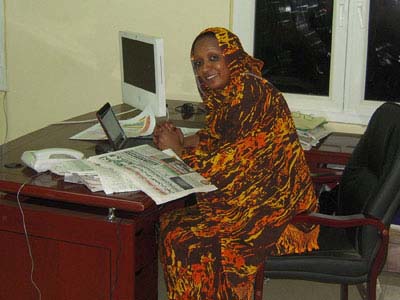Reporting on Activist’s Rape Increases Sudanese Crackdown on Media
by Sampsonia Way / August 5, 2011 / No comments

Amal Habani. Photo:http://elmordazblog.blogspot.com
On July 25th journalist Amal Habani was sentenced to one month in Sudan’s Omdurman Women’s Prison. Her crime was reporting on matters “sensitive to public morality.” Specifically, the charge was in reference to her reportage on Darfuri activist Safiya Ishaq, who was raped by Sudanese security forces in February.
Amal Habani was given two options: pay a fine of 2,000 pounds or serve a one month sentence in prison. She told Reuters “I will not pay the fine because the ruling is not fair.”
Habani is the second journalist to be sent to jail for writing about Ishaq; on July 5th Fatima Ghazali also chose prison over the fine. Ghazali has since been released after her lawyer paid the fine. Both women wrote for Al Jarida, a Sudanese daily newspaper. Their editor, Saad el-Din Ibrahim, has been fined 5,000 Sudanese pounds (approx. $1800) for “publishing false news.” Seven other journalists are currently waiting to be sentenced for reporting on Safiya Ishaq’s rape.
Ishaq’s story first started to gain attention in late February when she recorded a detailed and very emotional video recounting the day when three men forced her into a car, beat her, and then raped her repeatedly. Ishaq works with Girifna, a Sudanese student activist group that provides voter education and monitors political campaigns.
Crackdown on Reporters
This government crackdown on reporters and activists is part of a larger anti-media trend that has escalated in the past few weeks. Sudan is currently ranked 172nd out of 178 countries on the Index on Censorship list, and since South Sudan’s declaration of independence in the beginning of July the Sudanese government has increased its attacks on free media. On July 8th, the Khartoum Press Council revoked the licenses of six newspapers: Ajras Al-Hurriya, The Democrat, Juba Post, Khartoum Monitor, Advocate, and Sudan Tribune. Al-Obeid Meruh, the secretary general of the Press Council, claims that the newspapers were shut down because of partial South Sudanese ownership. The 2009 Press Act of Sudan does not allow foreigners to own newspapers.
However, others claim that there are political motives behind this act. Ajras Al-Hurriya’s managing director, Hussein Saad, told a reporter “It is because the paper is close to the SPLM (Sudan People’s Liberation Movement) and the opposition. It is common for the security forces to take Ajras Al-Hurriya and prevent it being distributed after it is printed. It has happened nine times this year.”
Read Sampsonia Way’s interview with Philo Ikonya, a Kenyan writer who was arrested for distributing information on government corruption.




